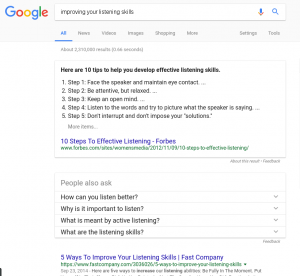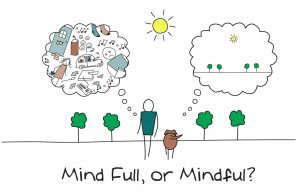 A quick Google search notes that there are over 2 million pieces on improving your listening skills. This implies that there is something seriously wrong with the status quo of a person’s average listening abilities.
A quick Google search notes that there are over 2 million pieces on improving your listening skills. This implies that there is something seriously wrong with the status quo of a person’s average listening abilities.
Why is listening important? Well, as a human, you want people to hear you, see you, and understand you. As a scientist, you want people to understand your work and — if not be passionate about it at least understand why your work matters. As an educator, you want your students to listen. And, as a student, you want to make a contribution that matters. We are all these things, all at once. We can’t pull out the facets of our being and show each side alone — they all act together. When we are a good listener, others want to listen to us — all dimensions of our being. It pays to increase our listening skills after all.
We are imperfect human beings. Of course we can improve listening. Let’s start this piece off on a positive note though, shall we?
The pros of our current listening skills
You’d think with all the improvement articles, classes, workshops, and push to improve our listening that this section would be empty. But you’re wrong. Melinda Zetlin (“8 Reasons You’re a Worse Listener Than You Think (and How to Get Better),” 2015) wrote a piece that briefly explores reasons why we might be terrible at listening. But within that, we can deduce some positive things.
1.) Our minds wander in the middle of the conversation.
 In general this is considered rude. When you check your email or do something else obvious in the middle of the conversation, it’s extremely rude.
In general this is considered rude. When you check your email or do something else obvious in the middle of the conversation, it’s extremely rude.
This is also a valuable lesson — not in social mores, but rather a deeper facet of yourself.
Consider this: What makes you lose interest and your mind starts wandering. Something else more pressing? You can’t understand what is so fascinating? You just find it utterly boring?
When you consider the root cause of your wandering mind, you can take yourself to the next level.
2.) We listen, understand, and evaluate from our worldview.
By the whole, there is nothing wrong with this — as long as you acknowledge it and work with it. That’s also the pro, here. When you know where you are coming from it’s easy to see how their worldview can interact with your worldview.
Anne Giacalone DiDomenico (“Dealing With Worldviews In Interpersonal Conflict,” 2001), founder and owner of Emerge Consulting LLC a conflict resolution company, wrote that there are several things that go into forming a worldview. There is the individual, collective, internal, and external dialogues to consider. DiDomenico explains that for everything that happens in our life, we seek rationale. And to deal with it, we write scripts that stay with us to be edited throughout our lives.
The rationale for the script came from the child’s need to create meaning. If a punishment model was dominant, the child wrote a script that dealt with protection. If a nurturing model was dominant, the child’s script dealt with self-expression. Whatever your early experiences, you continue to play the same patterns of thought into adulthood until you consciously look at them. The patterns of thought that make up a child’s script are grounded in assumptions based on and directly related to personal experiences. When we become adults, these same assumptions are at work creating meaning in our adult experiences. Yes, you may be in conflict with the neighbor according to childhood memories of similar events.
Those are the pros of keeping the status quo of listening. They don’t sound too bad, eh?
Well, you are better than that. If you’re here on Insanitek, I know that you’ve strived to be better in any number of geek ways to just being a better human being.
And that’s where the cons come in.
The cons are that at any given time when you’re listening, you’re also prone to one (or more) of these problems:
> You don’t really listen — instead you’re formulating how to move on.
> You not listening all the way to the body language as well.
> You’re probably not mind-mapping what the other person is saying so you can learn from it.
> You’re possibly judging, listening without empathy or connection, insensitive to emotional deaf spots, etc.
> You probably don’t ask for clarification.
> You might even think you have to agree with them.
All these are common occurrences and problems with the art of conversation.
We’re not going to solve that problem here. Instead, when you’re ready to increase your listening skills, I recommend Dr. Tony Alessandra’s 10 points and The Art of Manliness “Listen Up pt 2”… and the rest of the series. Both resources point to simple things you can do to improve your listening without a lot of stress and strain.
So use your secret power of metacognition to recognise where you are with your worldview, then become a better listener.
Because when you know how to listen, you know how to speak to people in a way they want to hear your story, learn your science, know why things you are passionate about matter, and so you can make that difference in the world.
